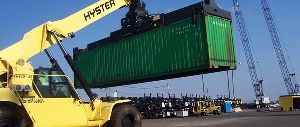The multi-purpose on-dock terminal project at Takoradi Port being implemented by the indigenous Ghanaian firm Ibistek Ghana Limited is set to take-off following the signing of an Engineering, Procurement and Construction contract between the company and Jan de Nul, the project contractor.
The first phase of the project involves the construction of 600metres of quay wall out a project total quay length of 1,700metres, with a 25-acre paved surface that is expected to be opened to traffic by the middle of next year.
This means that vessels that carry containers up to 19,000TEUs will be able to berth at Takoradi Port before the end of 2019, even though the entire project will take up to about five years to be fully completed.
The Board Chairman of Ibistek Ghana Limited, Lawyer Kwame Gyan, told B&FT at the EPC signing event: “This is the first time an indigenous company has been given a concession to partner with a local port authority to develop a facility that will be owned by Ghanaians. What we have demonstrated today is the beginning of proof that as Ghanaians we can do something for ourselves.
“We are grateful to President Akufo-Addo whose support has brought us this far, despite the fierce resistance from multinationals and foreign business community who thought we didn’t have the capacity.”
He added: “This landmark project means Ghanaians can go and participate in neighbouring countries and participate in port infrastructure development; because if you can build your capacity at home, you can transfer such expertise to the West African neighbourhood”.
Lawyer Gyan indicated that local content has been considered for the project as contractors in the locality have been well-informed, with some submitting their price quotations to the EPC contractor.
“The most important aspect of it is the fact that the project is owned by Ibistek, and so we have influence on taking key decisions relating to local content. Together with the GPHA, we are going to nominate the contractors who will be providing the local content services even though they will be supervised by the foreign contractor,” he stressed.
The Ibistek boss added that given the position of Takoradi in relation to the oil business, the project will reposition the port to provide needed support for the oil and gas industry as well as advancement of socio-economic activities and the livelihoods of people.
Transport Minister Kwaku Ofori Asiamah remarked that the project aligns with government’s vision to develop the country’s infrastructure with indigenous Ghanaian businesses, even as it welcomes partnerships from the foreign business community.
This is a project that has full support of the president, who has worked to ensure that it sees the light of day in his quest to promote local participation in the maritime sector.
“This project is a test-case for indigenous Ghanaian businesses to invest in the buoyant maritime logistics sector,” he said.
He added: “It is incumbent on government to put in place the appropriate legal framework and conditions that will enable the private sector to thrive.
“The IBISTEK project will help to revive the Sekondi-Takoradi metropolis, its numerous opportunities for job creation and dependent economic activities.”
Mr. Asiamah urged the project contractor to engage local content in execution of the project, especially those aspects of the business which Ghanaian businesses have the capacity to handle.
He also tasked them to work hard to avoid project over-run cost by delivering within the stipulated project period.
Area Manager of Jan de Nul, Filip Morobe, noted that there are extremely favourable conditions in the country to support the project’s completion.
“We had smooth operations with the Ghana Ports and Habours Authourity (GPHA) in the expansion of the Takoradi Port. We will work hard to ensure successful completion of the project and within the stipulated time,” he said.
Key project statistics
The new on-dock multi-purpose terminal is expected to attract diverted container traffic, particularly from the Port of Tema and other neighbouring ports such Lome and Abidjan in the excess of 33,000 TEUs in 2021, and grow to approximately 430,000 TEUs in 2040 when it peaks.
Although the terminal has a total capacity of 300,000 TEUs, 80 percent of the 600metre quay which is expected to be completed by mid-year 2019 will be allocated to the handling of multi-purpose cargoes – which translates into a total handling capacity of 240,000 tonnes per annum.
This figure is expected to be moved to 1.4 million tonnes with the construction of the terminal’s second phase – sometime before 2025, at the time the 600metre quay terminal nears its full capacity.
Cargoes to be handled through the multi-purpose terminal include wheat, bagged cocoa, bulk cocoa, ammonium nitrate and other general goods, with the Ghana Cocoa Board committing to push 70 percent of its cocoa exports through the Takoradi Port as a boost for the terminal.
It is also anticipated that the new multi-purpose terminal will become competitive to attract transit cargo, which is forecasted to reach approximately 183,000 tonnes by 2020 and grow at a CAGR of about 3 percent over the concession period.
Business News of Saturday, 22 December 2018
Source: thebftonline.com

















